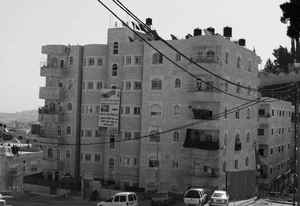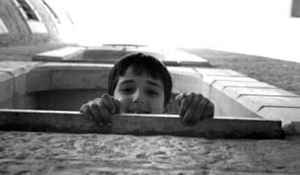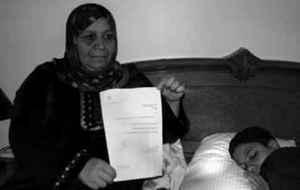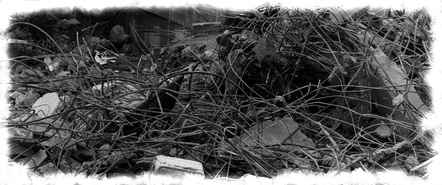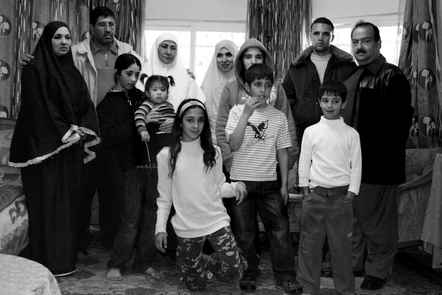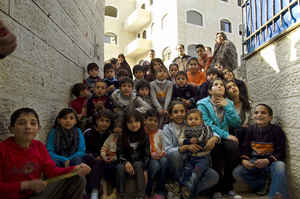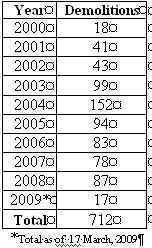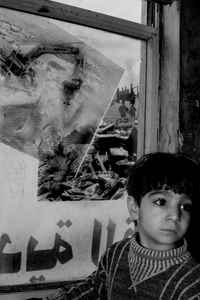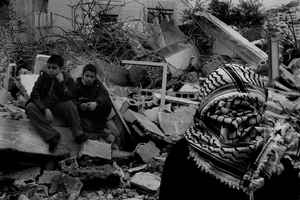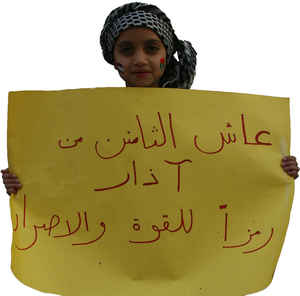Days of waiting
Impending house demolitions in silwan’s al abbasiyya neighborhood
March, 2009 - Published by ICAHD
Two buildings in al abbasiyya
The Municipality of Jerusalem continued its discriminatory and aggressive zoning and planning policies by issuing demolition orders for two large apartment buildings in Silwan’s Al Abbasiyya neighborhood on March 5th, 2009. The thirty-four families living in the two buildings were given just 10 days to evacuate their homes, before a demolition scheduled for any time after Sunday March 15, 2009.
The two buildings house over 250 people, including elderly and disabled persons and the Municipality has marked them as “illegal construction”, stating that only the first three floors of each (one is 6 the other 4 stories high) hold a valid license. Neither the landowner nor the Municipality informed any of the inhabitants about the license limitations when the individual housing units were purchased. None of the inhabitants were given prior warning nor offered alternative housing or financial compensation.
It was only in 2004, when all apartments had been completely sold, that the families first learned about the buildings’ status. According to the families, none of them would have invested their savings, time and energy into buying and setting up their housing units if they had known they would be targeted for demolition.
The eviction of the families in Al Abbasiyya is yet anther case of uprooting entire communities in East Jerusalem. The Municipality has announced plans to demolish over 180 houses in Silwan, Ras Khamis, Beit Hanina, A-Tur and elsewhere just in the first three months of 2009. A few meters further down from the Al Abbasiyya buildings, the neighbourhood of El Bustan has also been slated for demolition threatening 88 houses and over 1,000 people with homelessness. The residents of Abbasiyya, like their neighbors in Silwan’s El Bustan neighborhood have declared their refusal to abandon their homes and lives. The thirty-four families are urging you to show your solidarity and to stop accepting the Municipality’s agenda of displacing Palestinians from East Jerusalem.
House demolitions in east jerusalem
The first act of the Occupation in 1967 was the eviction of 650 Palestinians from the Mughrabi Quarter of Jerusalem’s Old City and the demolition of their 135 houses, making a plaza in front of the Western Wall out of a historic neighborhood. A policy of displacement and demolition has continued ever since. Houses in Occupied East Jerusalem have been demolished for: clearing land for Jewish historical sites, the construction of Jewish settlements as in 1973 in Beit Iksa, punitive reasons as in Jabal Mukkaber in January of 2009, and most commonly, for violations of zoning and planning laws designed and enforced without Palestinian input or consideration for the community’s needs. The number of demolitions in East Jerusalem sicne 1967 is at least 1,295, with several hundred new demolition orders issued annually.
The Jerusalem Municipality, which exercises authority over Occupied East Jerusalem, enforces zoning and planning laws insufficient for the needs of the people of East Jerusalem. The space zoned for construction is far too small at just 12.9% of the 70,000 total dunams of East Jerusalem. And the process of obtaining a building permit, even in that small area, is wrought with obstacles insurmountable for most of the Palestinian community. Yet moving from East Jerusalem and attempting to build in the West Bank leaves the community vulnerable to the confiscation of their ID cards and banishment from the city entirely. Thus Palestinians build without permits, “illegally,” and face the prospect of having their homes demolished. These demolitions are strictly forbidden by the Geneva Conventions which state an Occupying Power is prohibited from destroying property “except where such destruction is rendered absolutely necessary by military operations.” These “administrative” demolitions are just part of the 24,138 Palestinian houses demolished by Israel since 1967.
East Jerusalem Demolitions
For inquiries about the buildings, their residents, and what you can do to help, please contact the following:
Ibrahim Mresh 0507 829783 (Apartment owner, Arabic & Hebrew)
Omar Karaki 0548 199300 (Apartment owner, Arabic & Hebrew)
Ziad Kawar 0522 033092 (Advocate, Arabic, Hebrew & English)
Fakri Diab 0522 206227 (Bustan Center, Arabic, Hebrew & English)
Meir Margalit 0544 345503 (City Council & ICAHD, Hebrew, Spanish & English)
Jimmy Johnson 0542 652960 (ICAHD, English, Spanish & Hebrew)
The Israeli Committee Against House Demolitions wishes to thank the following for their generous support for our activities: Agencia De Cooperación Española Internacional para el Desarrollo, Asamblea De Cooperación Por La Paz, Christian Aid, Comité Catholique Contre la Faim et pour le Développement, Mennonite Central Committee, NGO Development Center.
ICAHD
PO Box 2030
Jerusalem 91020
Israel
Tel: +972 (0)2 624 5560
Fax: +972 (0)2 622-1530
E-mail: info@icahd.org
ICAHD UK
PO Box 371, Leatherhead
Surrey KT22 2EU
United Kingdom
Tel: +44 5602 409976
E-mail: info@icahduk.org
ICAHD USA
PO Box 2565
Chapel Hill, NC 27515
USA
Tel: +1 919 277 0632
E-mail: info@icahdusa.org
Further available translations of the text presented here:


